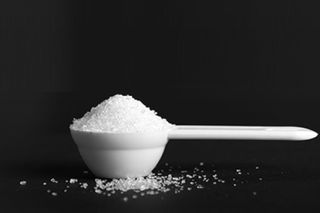
Should We All Quit Sugar? Maybe Not.
While processed sugars are just empty calories, removing natural sugars from our diets can contribute to deficiencies and eating disorders.

Sugar, sweet as it tastes, has a bit of a supervillain reputation — from sugar production feeding the demand for slavery in the Americas in previous centuries, to how the sugar industry paid researchers to downplay its risks and blame fat instead. With sugar linked to multiple disorders and described as “addictive” — it is time to rethink how sugar benefits us, how much sugar we consume, whether there’s a better type of sugar to consume, and whether quitting sugar is a reasonable option for everyone.
What is sugar?
Sugar is a colorless, water-soluble compound available in plant sap and mammal milk, among other substances, according to the Encyclopedia Britannica. There are two main kinds of sugars, simple sugars, or monosaccharides, which are a single sugar molecule that can be directly absorbed into the bloodstream, and complex sugars, or disaccharides, which comprise two sugar molecules that must be broken down by enzymes in order to be of use to the body. Examples of monosaccharides are fructose (found in fruits, vegetables, and honey), galactose (found in milk and dairy), and glucose (found in carbohydrates, proteins, and fats), and of disaccharides are sucrose (found in sugarcane and table sugar), lactose (found in milk), and maltose (found in wheat, barley, and candy).
What does the body do with sugar?
Sugars are carbohydrates, which are one of the body’s main sources of energy. After a person consumes any form of sugar, enzymes in the small intestine either break down the more complex sugars (disaccharides) into glucose or absorb the simpler sugars directly into the bloodstream.
The sugars then move via the bloodstream to various tissue cells, which use them to produce adenosine triphosphate (ATP) molecules, a source of cellular energy. The pancreas, an organ whose endocrine function is to regulate blood sugar, monitors sugar levels and releases the hormone insulin in response to blood sugar levels that are too high or low. If a person consumes more sugar than what the body needs, it is stored away as fat against future energy needs. When too much fat is stored in the body, it can result in disorders like obesity.
Red blood cells and the brain exclusively use the monosaccharide glucose for energy. Glucose can also be made from fat and protein within the body, if one’s carbohydrate intake is low. Other simple sugars like galactose and fructose are sent to the liver, where they are converted into glycogen and stored as surplus energy fuel — fat.
Related on The Swaddle:
We’ve All Been Sold a Lie About Non‑Sugar Sweeteners
What is the difference between natural and added sugars?
Sugar often occurs naturally in items that are part of a recommended healthy diet — like fruits, milk, and vegetables. Added sugars are manmade, created to add additional sweetness to a processed food item.
There is a clear difference between natural sugars and ‘natural sweeteners’ like honey, maple syrup, date sugar and more — which are still manmade, and therefore, added sugars.
Are natural sugars better than added sugars?
Yes and no. While one might assume that natural sugars are better than added, it turns out that the body cannot really recognize the difference between the two. “From a nutrition science standpoint, we really view them [natural and added sugars] as basically the same. … Our bodies can’t tell the difference whether it’s found in nature or added to a recipe because they’re not any different in terms of their chemical structure,” Colleen Tewksbury, Ph.D., M.P.H., R.D., a senior research investigator and bariatric program manager at Penn Medicine in the U.S., told Self Magazine.
The reason to choose natural sugars over added sugars is that foods with natural sugars — fruits, milk, and vegetables — come with significantly less natural sugar per item than the added sugar in each item of processed food. Foods with natural sugars also contain a number of beneficial compounds like water, vitamins, minerals, and fiber, which help delay digestion and absorption of the natural sugar. Delaying digestion of sugar is good, as the body uses energy to separate, break down and absorb these sugars — thus burning energy (fat) in the process and resulting in less excess energy-stored-as-fat in the body.
In comparison, added sugars are purely calories that get broken down and absorbed immediately — rapidly increasing blood sugar and the body’s fat storage.
Is too much sugar bad for you? Why?
According to the American Heart Association, men should eat a maximum of 150 calories of added sugars per day (9 teaspoons), and women should eat a maximum of 100 calories of added sugars per day (6 teaspoons).Compared to this, a bottle of Coke has 11 teaspoons of added sugar, digestive biscuits have 13 teaspoons in a 250-gm packet, and even vinaigrette dressing has 9 teaspoons of added sugar.
As for the foods marketed to the health-conscious, low-fat yogurt can contain up to 12 teaspoons of added sugar; 100 gm of granola can contain more than 6 teaspoons of added sugar; and vitamin water contains about 8 teaspoons of added sugar. Looking at the above, it’s no surprise that global sugar consumption has grown from about 130 to 178 million tons over the last decade.
Though eating or drinking a high amount of fruits, vegetables, or milk — all foods with natural sugars — may cause an upset stomach, it is virtually impossible to eat them in an amount that leads to excess sugar and fat storage. These are natural foods with small amounts of natural sugar, as compared to processed foods that contain a large amount of added sugar.
Having a lot of added sugar, combined with a bad diet, has been linked to obesity, heart disease, acne, Type 2 diabetes, cancer, depression, aging, non-alcoholic fatty liver disease, kidney disease, cavities, gout, and even dementia.
Should you quit sugar?
Yes and no.
While an individual can survive perfectly fine by cutting out added sugars, some sugar-free diets actively promote cutting out all sugars — including fruits and dairy — for benefits such as weight loss. The problem with quitting natural sugar, too — a concept gaining immense popularity — is that it promotes an extremely restrictive diet, which in turn, promotes an unhealthy relationship with food in general that risks orthorexia, an eating disorder in which a person becomes obsessed with eating healthy. Plus, quitting foods like fruits and dairy due to their natural sugar content puts people at risk of vitamin, mineral, and fiber deficiencies. Besides, constantly hunting for replacements to natural sugar-heavy foods is an expensive, time-consuming process.
Bottom line? Experts advise avoiding added sugars as much as possible by keeping an eye out for the different types of sugars on ingredients lists when you shop, and consulting a doctor for dietary advice if you have, or suspect, any illness related to blood sugar.
Aditi Murti is a culture writer at The Swaddle. Previously, she worked as a freelance journalist focused on gender and cities. Find her on social media @aditimurti.
Related


Childhood Trauma Linked to Early, Premarital Childbirth and Poor Health for Women
